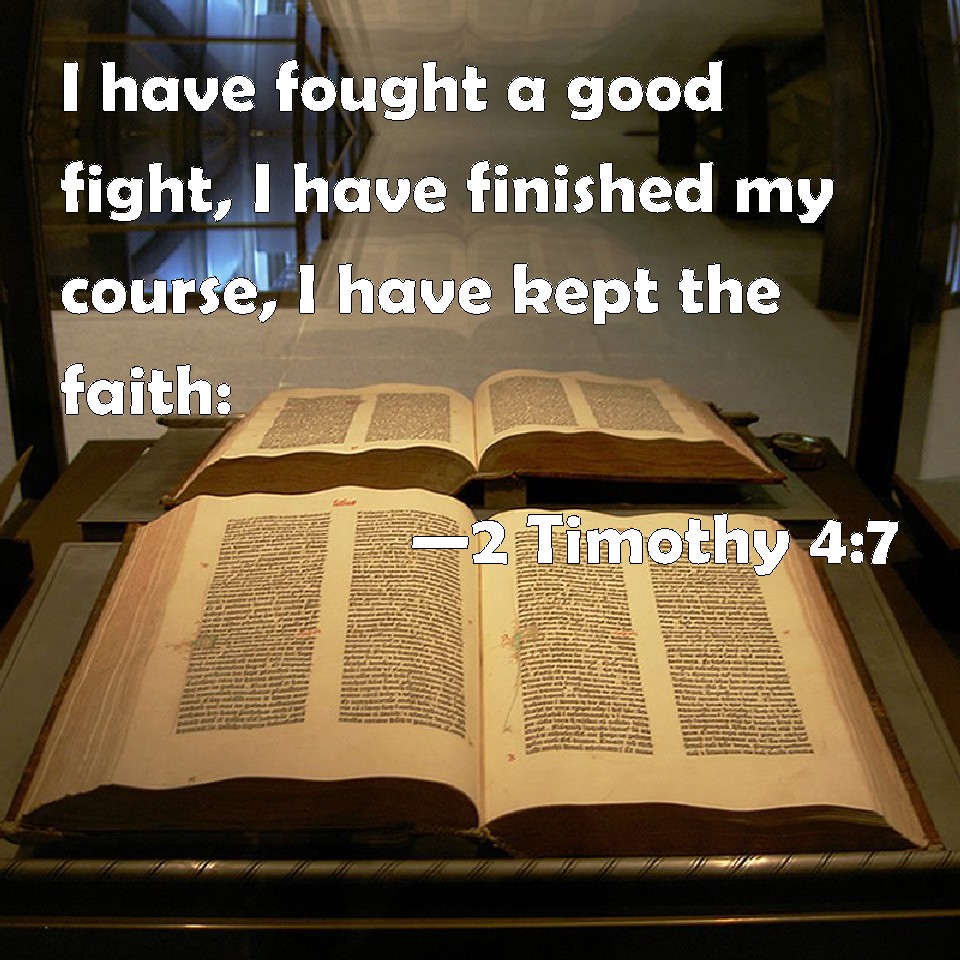In Paul’s second epistle to Timothy, Paul offers a personal challenge to Timothy to keep following Jesus no matter the sacrifice and risk. The letter also reminds Timothy to maintain faith and hope in Jesus’ resurrection and raise up faithful leaders who will teach the good news about Jesus.

Christians should fear God more than fearing what other people think if they will follow God. So, the very point of Paul’s encouragement to Timothy is to remind him how important it is to keep the faith. Keeping the faith is like fighting a long and ambiguous battle.
Paul writes to Timothy to encourage him. Paul is facing the worst of all hardships: his own impending death. So, he encourages Timothy to stand strong in his faith, with a reliance on the written Word of God.
Paul Dies and Timothy Takes Over
Paul is charging and commanding Timothy to hold to the faith he (Paul) has seen and lived. Timothy can do this knowing that Paul has faithfully served God and expects the heavenly rewards given to all of Christ’s followers.
Timothy is about to take the baton of leadership. Paul says the time of his departure has come. The death of Paul will be his release from the imprisonment of this world and his departure to the enjoyment of another world.
Paul Fought the Good Fight
Throughout his ministry Paul used the picture of the race and the Christian being an athlete running that race (Philippians 3:12-14, Acts 20:24, 1 Corinthians 9:24, Hebrews 14:1). Now he knew his race was just about finished.
The point of 2 Timothy 4:7 is that Paul had fought “the good fight,” the only fight worth fighting.1 Paul’s deep desire, expressed early in his ministry, to “finish my course with joy” (Acts 20:24) had been fulfilled (2 Timothy 4:7)2.
While writing his second epistle to Timothy, Paul looks back over 30 years of labor as an apostle (AD 36-67/68). Like an athlete engaged successfully in a contest (“fought the good fight”), he had “finished the race” and “kept the faith,” i.e. had carefully preserved the deposit of Christian truth/faith.3
It is a good endeavor at every stage of life to look back on the previous stage. Prayerfully ask if you fought the good fight and are running a good race. Of the things which God has called you, have you kept faithful? Consider all the roles God has assigned you.
The Crown of Righteousness
Paul knew there was a crown waiting for him in heaven, and he was ready to receive it. He was certain of it. In 2 Timothy 4:8 Paul mentions the crown of righteousness. He stated that this crown was laid up for him by the Lord, the Righteous Judge, and it will be given to him. It is also available to all those who loved Christ’s appearing.
The crown of righteousness is only one of the crowns symbolizing rewards for faithful service. Christ will award crowns at His judgment seat (1 Colossians 3:14; 2 Colossians 5:10). In the Bible, the crowns include:
- “an incorruptible [crown]” (1 Corinthians 9:25),
- the “crown of rejoicing” (1 Thessalonians 2:19),
- “the crown of life” (James 1:12; Revelation 2:10),
- and “a crown of glory” (1 Peter 5:4)4 .
Paul envisioned an awards ceremony where he would receive the crown that waited for him. Paul was about to be condemned and executed by an earthly court, but he was also going to be rewarded by a heavenly Lord.
This reward is not Paul’s to seize. He didn’t earn it, necessarily, but his faithful service buttresses his confidence that the Lord will prove faithful in providing it to all who faithfully await His appearance. The point of Paul’s encouragement to Timothy is to remind him how important it is to keep the faith. Keeping faith is like fighting a long and ambiguous battle.
Crowns in the Bible
There are two main words for “crown” in the New Testament. One refers to a royal crown and the other to the victor’s crown (the stephanos). Here Paul referred to the victor’s crown – the crown that was essentially a trophy, recognizing that one had competed according to the rules and had won the victory.
In Paul’s day winners in the world of sports received a crown of olive or ivy leaves that soon withered and died. But the crown for God’s people lasts forever (1 Corinthians 9:25, 1 Peter 5:4).
We are promised the crown of life if we will endure temptation (James 1:12). Paul tells Timothy, the promised crown is also for us – if we will set our focus on heaven and on the Jesus who both walked the earth and now reigns in heaven, who is waiting to receive us. The Ephesians maintained an intense longing for Christ’s appearance (2 Timothy 4:8) because they love and trust Him so much. Paul’s hope was never “bound to a fixed date but to the gospel that pronounced the fulfillment of the Old Testament promises and called for trusting existence.5
In Paul’s day winners in the world of sports received a crown of olive or ivy leaves that soon withered and died. But the crown for God’s people lasts forever (1 Corinthians 9:25, 1 Peter 5:4).
We are promised the crown of life if we will endure temptation (James 1:12). Paul tells Timothy, the promised crown is also for us – if we will set our focus on heaven and on the Jesus who both walked the earth and now reigns in heaven, who is waiting to receive us. The Ephesians maintained an intense longing for Christ’s appearance (2 Timothy 4:8) because they love and trust Him so much. Paul’s hope was never “bound to a fixed date but to the gospel that pronounced the fulfillment of the Old Testament promises and called for trusting existence.5
Some people wonder if we will walk around heaven with crowns on, and everyone will notice who has the bigger and better crowns. But in Revelation 4:10, the elders surrounding the throne of God take their crowns and cast them before Jesus – giving any trophy they have received right back to Jesus.
Some feel that Paul was too focused on rewards and that it isn’t proper for Christians to think much about the reward they will receive in heaven. Yet God has no problem motivating us with heavenly rewards. It will be worth it. We must hang in there now. We will be rewarded.
Some Christians worry unnecessarily about their crown:
· What if I don’t get a crown?
· What if my crown is really small?
· What if the Lord is disappointed in me?
We should ignore all these speculations and simply be busy serving and glorifying God and our crown will take care of itself.
Paul’s Last Letter
2 Timothy is the last letter the Apostle Paul ever wrote. He was standing on the verge of eternity, full of God, and strongly anticipating an eternity of glory.
God provides for man’s needs (Matthew 5:45; 6:25-32; Acts 14:17) and determines the time and circumstances of man’s death (Psalm 90:10; John 21:21-23; 2 Tim. 4:6-8)6
Before Paul was a Christian, he supervised the execution of the first martyr (Stephen) and then began to kill as many other Christians as he could. But now at the end of his life, he was ready to receive a crown.
What is the Time of the Reward?
It is when Christ comes again that the rewards will be given (Matthew 16:27; Romans 2:5-10; Timothy 4:8; Revelation 11:18; 22:12).7 Paul also makes much of the second coming as an occasion of deliverance and glorification (Romans 2:3-1; 1 Corinthians 4:5 2 Thessalonians 1:5-2:12; 2 Timothy 4:8).
At the end of the age, God will still be the righteous judge but will mediate that judgment through the Son, for the Father judges no one, but has entrusted all judgment to Christ. So that all may honor the Son just as they honor the Father (John 5:22, 23; 2 Timothy 4:8).8
Paul had “love[d] Christ’s appearing (2 Timothy 4:8)” ever since his conversion. In his earlier ministries, he had thought that he would be among those still living when Christ returned (1 Thessalonians 4:17.) As time went on, he realized that he must die before that day, but he knew that, for the believer, “to die is gain” (Philippians 1:21). As he wrote this last epistle, he knew that “the time of my departure is at hand (2 Timothy 4:6).”
In Summary:
In Paul’s second epistle to Timothy, the fourth chapter, Paul offers a personal challenge to Timothy to keep following Jesus no matter the sacrifice and risk. Paul’s encouragement to Timothy is to remind him how important it is to keep the faith. Keeping faith is like fighting a long and ambiguous battle.
In 2 Timothy 4:8, Paul states that the crown of righteousness was laid up for him by the Lord, the Righteous Judge. The crown is also available to all those who loved Christ’s appearance.
In the context of the whole letter, Paul implies that Christ will continue to help him persevere in faith through all evil to attain the eschatological goal of entering the fullness of Christ’s kingdom at his second coming, together with all the righteous (2 Timothy 4:8).
__________________ SHOP: ________________


NASB Comfort Print Thinline Bible, Red Letter Edition–bonded leather, burgundy
By Zondervan
The beloved 1995 Edition of the New American Standard Bible is now easier to read with Zondervan’s exclusive NASB Comfort Print® typeface. This edition of the NASB Thinline Bibles is available in a variety of sophisticated designs in a portable, easy-to-read format.
- The full text of the New American Standard Bible, 1995 Edition
- Exquisite, durable covers
- Less than one inch thick
- Double-column format
- Presentation page
- Two satin ribbon markers
- Words of Christ in red
- Exclusive Zondervan NASB Comfort Print 9 point type
Features:
____________________________________________
In conclusion, consider what the Daily Bread email message sent on 1/18/2023 says,

2 Timothy 4:7, 8 – I have fought the good fight, I have finished the course, I have kept the faith; in the future there is laid up for me the crown of righteousness, which the Lord, the righteous Judge, will award to me on that day; and not only to me, but also to all who have loved His appearing. (NASB)
Paul issues a personal challenge to Timothy to keep following Jesus no matter the sacrifice and risk. Paul’s encouragement to Timothy is to remind him how important it is to keep the faith. Keeping faith is like fighting a long and ambiguous battle.
Paul states that the crown of righteousness was laid up for him by the Lord, the Righteous Judge. The crown is also available to all those who loved Christ’s appearance.
Prayerfully ask if you fought the good fight and are running a good race. Of the things which God has called you, have you kept faithful? Consider all the roles God has assigned you.
You Can Receive The Daily Bread, for FREE.
To receive the Daily Bread email messages, free on Mon., Wed., and Fri., in your email inbox, just fill in the form below or send an email, and ask to be added, to jmikeh@jmhowington.com
References:
- Stanley M. Horton, general editor, Systematic Theology (Springfield, MO: Legion Press, 1994), pg. 571.
- Morris, Henry, The New Defender’s Study Bible (Nashvillle, TN: World Publishing Inc. 1995 and 2006, pg. 1878.
- “NIV,” International Bible Society, The Holy Bible, New International Version, Study Bible (Zonderman Publishing House copyright 1973, 1978, and 1984.), pg.1876.
- Morris, pg. 1878.
- Schwartz, Hans, “Eschatology,” (Grand Rapids, MI: Wm. B. Eerdmans-Lightning Source, 2000), vol 2, pg. 498.
- Henry C. Thiessen (revised by Vernon D. Doerksen), Lectures in Systematic Theology (Grand Rapids, MI: Eerdmans, 1981), pg. 124.
- Ibid, pg. 353.
- Horton, pg. 632.
